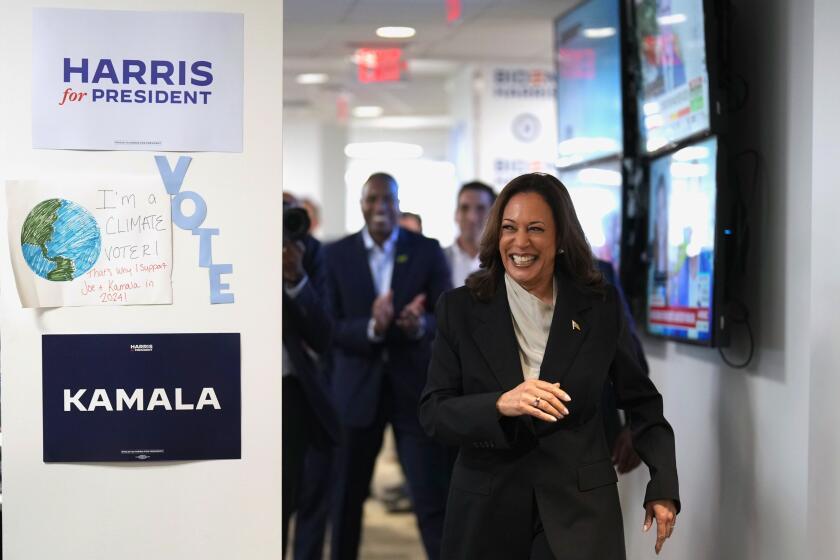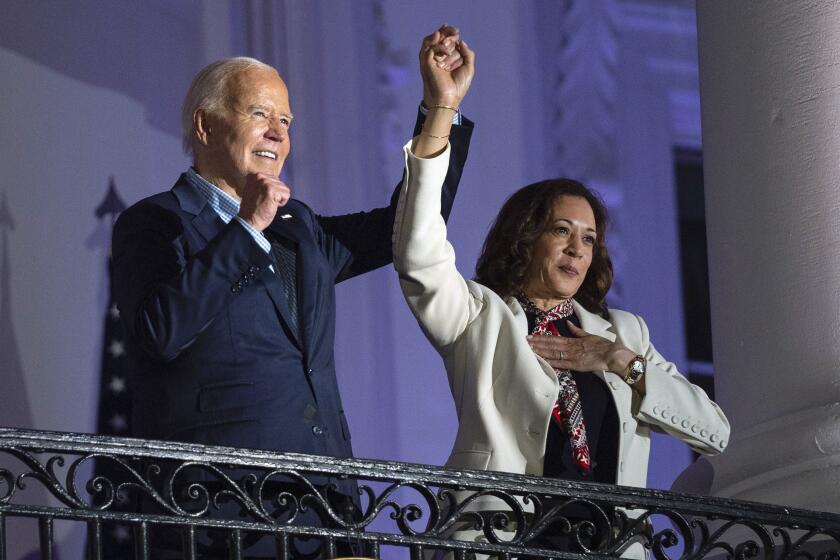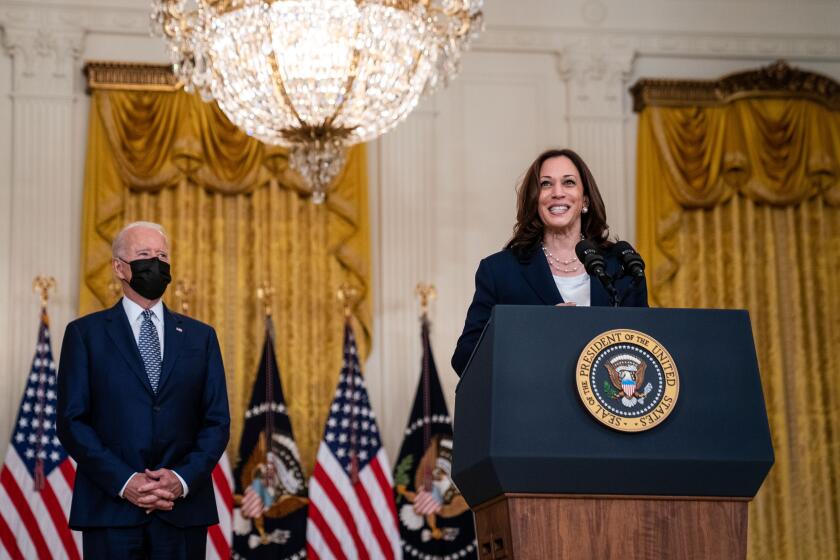Clinton Proposes Free TV Time for Candidates
President Clinton said Tuesday he wants to require broadcasters to give candidates free television time, saying that would “help free our democracy from the grip of big money.”
He also used a morning speech to press Congress for passage of a bipartisan proposal to reform the laws governing donations. But within hours, Clinton attended two “grip-and-grin” fund-raisers, where affluent donors paid as much as $25,000 per person to share time with him. Under the campaign reform proposal Clinton supports, 90% of the money raised at the second event would be illegal.
Clinton proposed that broadcasters, when they receive licenses for digital television broadcasting, a technology still being developed, be required to offer free television time to candidates. Within the next several years, broadcasters are expected to move from using traditional analog signals to digital signals, which will improve picture quality and increase the number of broadcast channels.
“I believe broadcasters who receive digital licenses should provide free air time for candidates and I believe the FCC should act to require free air time for candidates,” Clinton said. “Free air time for candidates can help free our democracy from the grip of big money.”
After Clinton spoke, FCC chairman Reed Hundt said he believes the requirements for broadcasters are within reach--with or without legislative action.
“The FCC has the power, precedent and procedures to issue a rule ordering free air time access by candidates,” he said. Under federal law, the FCC is required to ensure that all spectrum users serve the “public interest, convenience and necessity” and the agency has exercised this power numerous times--banning cigarette ads, for instance, and regulating children’s television.
The president challenged broadcasters to provide free air time without delay, before the new television technology comes on line. “I believe it should be available, especially to candidates who limit their own spending,” Clinton said.
Clinton also signed an executive order Tuesday creating an advisory committee charged with recommending within a year guidelines for broadcasters’ public-interest obligations.
Although Clinton did not mention directly the campaign fund-raising controversies dogging the Democratic Party and his White House, he stressed a possible silver lining to the broadening donations scandals.
“We have to use the present intense interest in this--as well as the controversy over fund-raising in the last election and all the publicity over it--as a spur to action,” Clinton told a friendly audience attending a conference on free television and political reform.
In an apparent reference to partisan differences over the scope of congressional investigations of fund-raising practices, Clinton added: “We cannot let it become what it is in danger of becoming, which is an excuse for inaction.”
Although the FCC does not currently require broadcasters to offer access to candidates, several television networks offered the 1996 presidential candidates free air time. Clinton and Republican challenger Bob Dole made 25 free appearances--ranging in length from 1 to 2 1/2 minutes--in the last months of the campaign, according to Hundt.
The proposal is not without its critics, however. The National Assn. of Broadcasters argued that mandating broadcasters to provide free air time to candidates would be unconstitutional.
In fact, broadcasters’ opposition to the proposal could prove formidable. Sen. John McCain (R-Ariz.), a chief sponsor of the bipartisan campaign finance reform proposal that Clinton supports, calls the NAB “the most powerful lobby I’ve encountered in my time in Washington.”
Under McCain’s proposal, co-sponsored by Democratic Sen. Russell D. Feingold of Wisconsin, candidates who abide by voluntary spending limits and raise 60% of their campaign funds in their home states would be rewarded with as much as 30 minutes of free broadcast time in each election.
Clinton also used the speech to reiterate his support for McCain’s efforts and renew his call for Congress to pass campaign finance reform by July 4.
Just hours later, however, Clinton was busy raising money for the Democratic Party.
Clinton’s first stop Tuesday evening was a campaign fund-raiser for Sen. Byron L. Dorgan (D-N.D.) at the Hay-Adams Hotel just across Lafayette Park from the White House. The second event was an exclusive Democratic National Committee fund-raiser for some of its “large” donors--those individuals who previously gave more than $10,000 or corporations who gave $15,000 or more.
In the ornate Crystal Ballroom of Washington’s Sheraton-Carlton Hotel, 24 men and 13 women joined Clinton in a dinner of swordfish, mixed greens, spring vegetables and candied chestnut ice cream at a cost of $25,000 each. The donors--labor leaders, attorneys, bankers and business people--listened as Clinton pitched his proposal to offer free air time to candidates who observe voluntary spending limits.
The event was expected to yield $575,000--90% of it in so-called soft money donations--large, unregulated donations to political parties--which would be outlawed under the McCain-Feingold bill.
An ebullient Clinton told donors that “there is much more to do” and praised Colorado Gov. Roy Romer, general chairman of the Democratic National Committee, and national chairman Steve Grossman for putting the Democratic Party “four-square on the side of passing campaign finance reform this year.” But Clinton said that he wanted “all the Democrats to stay out there” agitating for reform, adding that “we need to be on the side of change.”
White House spokesman Mike McCurry said the president sees no problem with attending such fund-raisers.
“It’s not hypocritical to say that we have to change the campaign finance system we have and continue to raise money in the system that exists,” McCurry said, reminding reporters that Republicans outspend Democrats.
“The fact is that there are going to be campaigns,” he said. “We are not asking the taxpayers to pick up the tab for it. So someone is going to have to contribute the money.”
Times staff writer Melissa Healy contributed to this story.
More to Read
Get the L.A. Times Politics newsletter
Deeply reported insights into legislation, politics and policy from Sacramento, Washington and beyond. In your inbox three times per week.
You may occasionally receive promotional content from the Los Angeles Times.






